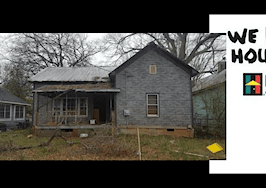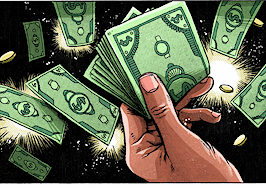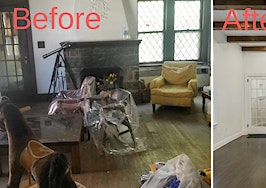Critics argue that Opendoor and other homebuying and selling startups, known as iBuyers, are flippers masquerading as tech companies.
They frequently point to HomeVestors, a home-flipping franchisor that is also known as the “We Buy Ugly Houses” company, as a firm that long ago ironed out the essentials of Opendoor’s business model. But in a Q&A with Inman, HomeVestors CEO David Hicks strongly disagreed with this assessment. The main reason? iBuyers generally purchase nicer homes, do fewer repairs on them and resell the properties faster than HomeVestors affiliates. In other words, iBuyers don’t buy ugly houses, but HomeVestors affiliates do.
This interview has been edited for clarity and length.
How would you describe the iBuyer business model as embodied by Opendoor?
I think the iBuyer model is focused on helping people that have a newer house, that with little to no repairs [can] have a quick exit — to sell their house and have a known exit, and as such, I think they provide a pretty good service to homeowners.
What technologies or protocols characterize the iBuyer business model?
The iBuyers have created a great model of predicting what a house’s value is, assuming it is in need of little repairs. The thing it misses is — they don’t look at the actual inside of a house, and so how can they predict what repairs a house would need?
I think they create a pretty good value, again, for people who don’t have much repairs. If they have much repairs, most of them are pretty surprised when the value is dropped pretty significantly.

The kitchen of a Queens, New York, home before HomeVestors renovations | Courtesy: HomeVestors
Has your assessment of the iBuyer model changed over time? Do you think it could have a bigger impact and more staying power than you originally thought? If so, why?
I think the iBuyers will be around and I think they can be around. I don’t know. I guess my mind has changed some over the years. I think they have adjusted their model more.
I think the risk of an iBuyer is their margins are so slim. If the market slows down, they have the risk of what’s going to happen with those houses because when they’re running on such slim margins, they need to have that speed of turning to make it pay off and reduce that risk.
I think they will have part of the market, and I think they can probably keep a part of the market that they will do very well. We’re a niche market because the houses we buy were — 80 percent of them — built in 1985 and before. We don’t try to compete with the iBuyers. We really don’t want to compete with them, and I don’t think they want to compete in our market.
The question would be how quickly can they [iBuyers] adjust to a new market and how quickly they can adjust what they’re paying for market and you know with the way they value houses and their formulas there. They may actually have a very good feel for the market, and so it’s very possible they’ll be able to adjust in a way that will make them viable by doing that.

The kitchen of the Queens, New York, home after HomeVestors renovations | Courtesy: HomeVestors
Any strengths of the iBuyer model that you haven’t addressed yet?
They know which houses they can make a profit on and which houses they can value, and I think their strengths are they stick to their models of doing it. That’s why after the first few years when they come in a market our franchisees tend to not even run into them because they’re working a different part of the market then we are, and so they’re staying with the houses that they can’t value … they know the more they shift from that model the higher risk they have.
I think the ones they compete with are real estate agents more than anybody because the houses they’re trying to buy are the ones most likely to sell retail … and so I think the real question I have for that model is will the real estate agents adjust? Will they be able to adjust to the model of the iBuyer and be able to compete with them? It’s the people that want to sell their house quickly and maybe want to buy another house and have a known price that … seems to be their biggest market”
Could iBuyers go mainstream?
The reality is that there are people who are willing to sell their house for less if they don’t have to … for ease and there are people that are willing to go through showings, through the Realtor … to be able to sell the house and get a little bit more for it.
The reality is the iBuyers right now, ‘yes, they’re having a pretty good show. Their market share is growing, but it’s still a portion of the market.
I think the agents that provide the best service will find there’s a place for them just like the iBuyers. I think there’s a great place for them for those people … that are willing to take a little bit less for an easy sell.

The living room of a Queens, New York, home before HomeVestors renovations | Courtesy: HomeVestors
How have iBuyers impacted HomeVestors franchisees in markets where iBuyers are most active, including Phoenix, Dallas-Fort Worth, Atlanta and Raleigh, North Carolina?
Remember, Teke, our trademark, “We Buy Ugly Houses,” attracts a certain type of seller. It’s a seller that has a house that they view as ugly for some reason. Most of the time it’s because it has significant repairs … Again, I don’t think that Opendoor really wants the houses that are older and have significant repair issues.
If they have light repairs, absolutely, we might lose a few [to iBuyers] of those that call us that really wanted ease of sale, but our numbers do not show [iBuyers] had much of an impact.
I think when one of them went into Denver, they even said, “We don’t buy ugly houses. Well, we do.
Our lead flow has been just as good … we are more focused on what our market is. So it’s probably helped us focus on the segment of the market that we can help

The living room of the Queens, New York, home after HomeVestors renovations | Courtesy: HomeVestors
But iBuyers presumably are thinking about performing heavier renovations on some acquisitions than they do now, and then selling them for a significantly higher profit than they do now, in the tradition of home flippers. Opendoor said it wants to offer on-demand repairs or renovations. Does any of this concern HomeVestors, as far as its franchisees’ ability to remain competitive?
We’re always evaluating what they’re doing, as we do with all of our competitors. From what I’ve heard and read … [iBuyers are] telling people you need to do repairs before they buy it, and they’ll help them with the contractors that want to do that. The reality is if the homeowner can sell that home to us and not have to touch their repairs … they’ll sell it to us.
So iBuyers are asking people to make repairs?
We’ve heard that a lot … that’s when [homesellers] call us.
[IBuyers will] do light repairs, and if it’s heavy repairs, they might do it, but they discount it [the home offer] quite a bit on the house. We get a call from someone that then wants to sell the house to us because they haven’t been happy with their discount [the downwardly revised offer made by the iBuyer after an inspection] on the house that much.
Is it fair to say iBuyers are making better use of technology than most HomeVestors’ franchisees? If so, how?
I’m not sure that is accurate because we have upgraded all of our tools and our franchises have everything now from an iPad app to all the things available to go to a house.
What our franchises do — they’ve got the technology to make an offer on the spot, and they’ll buy the house at that price. They’re not going to come back and renegotiate the price after it’s inspected.
I think that’s part of what we do that is different … our franchises — they’re never going to make an offer without a house because there’s too many factors that can affect the price of that house based on the condition of that house.

The bedroom of a Queens, New York, home before HomeVestors renovations | Courtesy: HomeVestors
How about their use of online communication and transaction platforms, automated valuation models that draw on machine learning and self-touring technology like smart locks and motion sensors?
They have made great leaps forward in the technology, and I think Realtors are trying to catch up with them. We’ve done a lot of stuff to help our franchises be ready to go compete with that. But I think they’ve got some great tools there.
What technology do you provide to your franchisees?
[HomeVestors’] iPad app learns what repairs they’re going to take. It helps learn locally what repairs are done, and they’re just a lot of different things that we’re always upgrading. We’re not as good as they [iBuyers] are but our franchises — the thing they don’t have technology-wise that we do have is a local person who also learns and adds their experts to it.

The bedroom of the Queens, New York, home after HomeVestors renovations | Courtesy: HomeVestors
Have iBuyers spurred HomeVestors to put more resources into developing technology that could help its franchisees operate more efficiently, such as an online offer request platform?
No, we are not going to do an online offer requests; we’re not going to try to compete with what they do … [HomeVestors’ goal] is having a person who sets eyes on the house, but not only that, but helps that homeowner with whatever challenges are and recommends the best solution for them.
We recommend and refer people to agents, Opendoor and other platforms all the time … If we’re not the best solution for a homeowner, we tell them.
What sort of ethical guidelines does HomeVestors hold its franchisees to?
First thing we do when we go and meet with a homeowner is we’re trying to find out why they called us — what it is that they have, what is it that they’re trying to solve, and then we go help them … either we or someone else can make a good solution… we focus on the person, that homeowner, even before we look at the house, and that’s what really sets us apart.
The reality is there are some people who call us that ought to sell to a Realtor and our franchises for the most part will recommend that.
Do iBuyers raise any concerns for you?
Not really … we’ve had franchisees say, ‘Why don’t we go compete with them?’ And the reality is we don’t want to compete with them because those houses aren’t the houses that we’ve ever bought.
What about from a consumer perspective?
I think consumers in today’s world are better educated … the reality is in today’s world, we need to all have the consumer in mind.
I’ve recommended some people go with iBuyers, and I’ve had some people that I know that went with iBuyers and saw their deal and decide not to do it — friends locally — and so I think there is a place for their service, absolutely.
I think as iBuyers become more defined, it’s going to be more for Realtors than for HomeVestor franchises to make sure to figure out what niche of the market they want to build a business in and really be the best at that niche.
Could iBuyers viably charge less than real estate agents and still achieve profitability?
I don’t know if I have an answer to that right now. I probably ought to pass on that one.
From what I’ve heard, I think the ones I know that have … gone to an Opendoor or one of the others, and then go to a Realtor they thought they were getting a better price through a Realtor, but it was more work. Now? I don’t know. I have not seen the numbers, so I can’t answer that directly.
So should real estate agents worry about iBuyers?
I think a good Realtor that provides good service will always have a place. A marginal Realtor I think will get hurt.
Do you think iBuyers are buying at or close to market value, as some claim to?
Yeah, I think they probably are. Right now, where there is so much good data on what a house is worth, consumers are becoming more and more educated on the value of a house.
What are the most impactful companies, technologies and trends that will shape the real estate industry in the years ahead?
I think that transparency will be good for the whole industry … just in the last few years — right now anybody can look up and see between the Zestimate and the different ways online you can see when a house was bought what it bought for, what it sold for — there is just a lot of transparency right now that’s going on.













